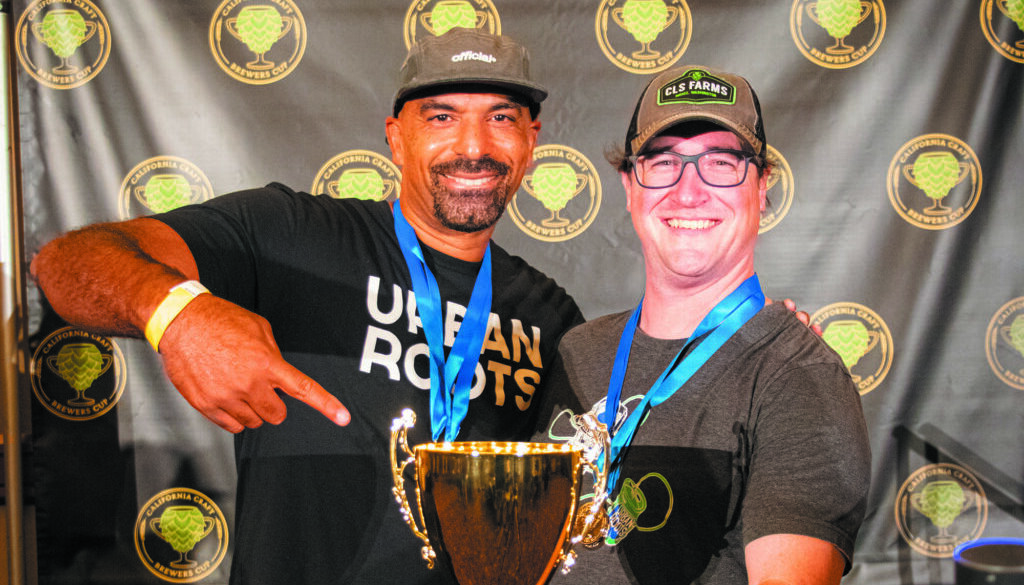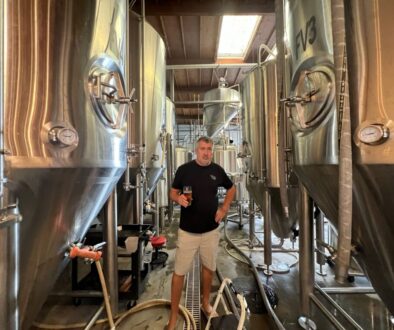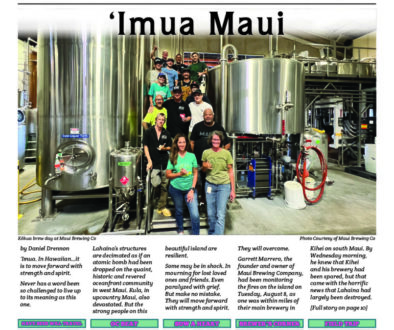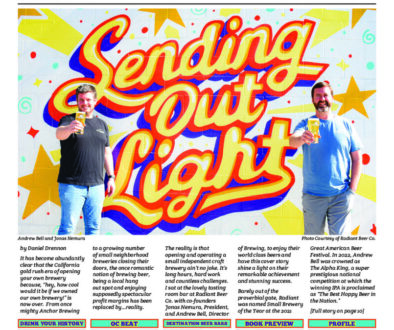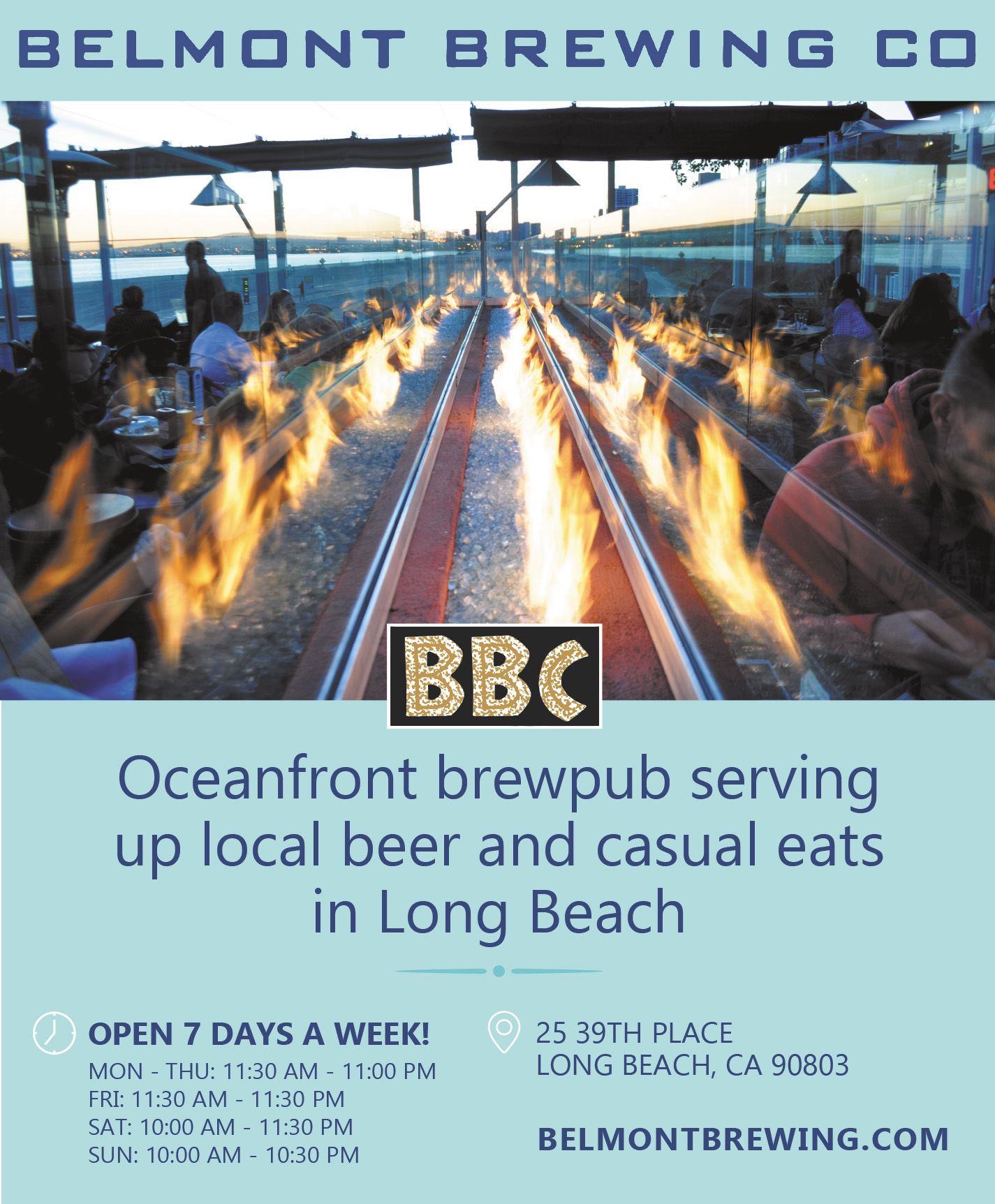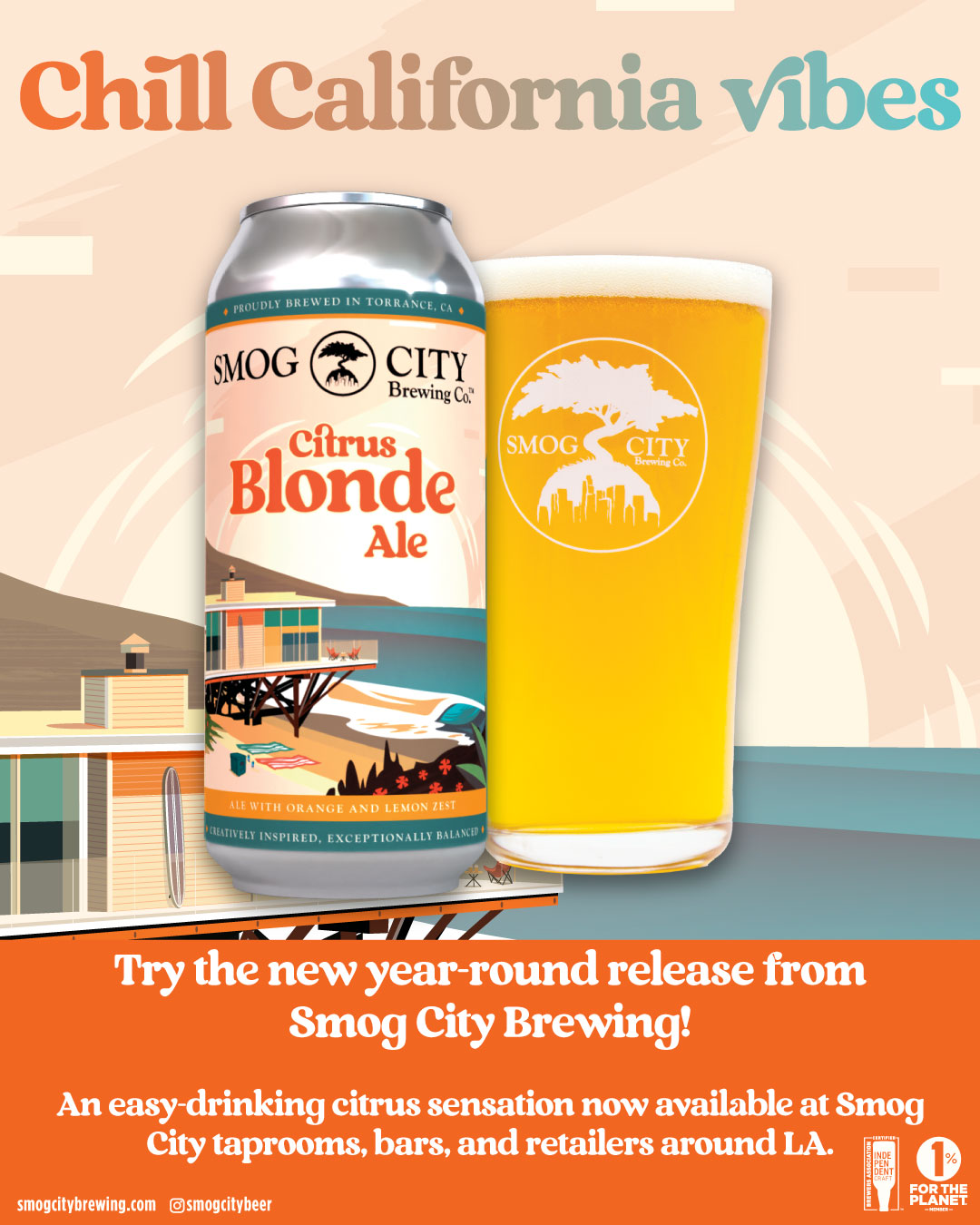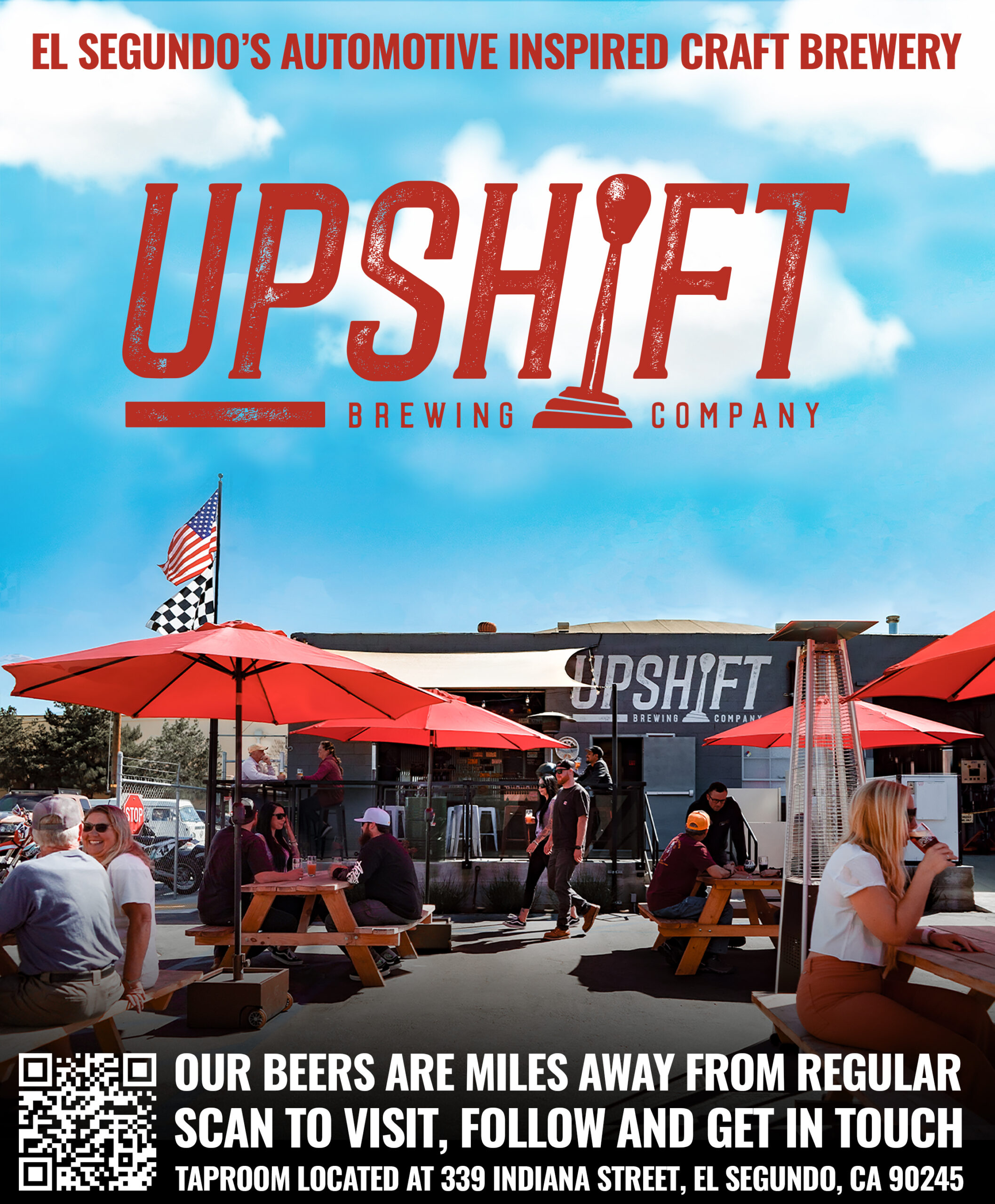Passion, Process and Patience
Urban Roots Brewing and Smokehouse: 2021 Brewery of the Year
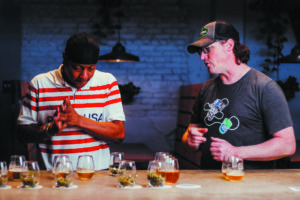
Photo Credit: Troy Cooper / Urban Roots
At the California Craft Brewers Cup awards this Fall, unsurprisingly Urban Roots Brewing and Smokehouse was named “Brewery of the Year” for the state of California. Sadly, Beer Paper was still dormant due to the Damnemic. Otherwise, Urban Roots would have surely been our October cover story. Now that the paper has risen like the proverbial Phoenix, we interviewed Urban Roots brewmaster and co-founder Peter Hoey as our year-end cover story.
Urban Roots launched in Sacramento way, way back in May, 2018 to high expectations, as well as excitement and anticipation, since Hoey and co-founder Rob Archie were already respected, if not revered, in the wonderful world of craft beer.
Hoey, who doesn’t look old enough to have spent nearly a quarter of a century honing his knowledge and skills, has evolved as a brewer the old-fashioned way. First, he got an education as a student, but later became a long-time teacher, at the American Brewers Guild. He climbed the ladder from being a shift brewer at some obscure place in Chico, Sierra Nevada, before accepting the head brewer gig at Bison Brewing in Berkeley. His next step was becoming the brewmaster at Sacramento Brewing Company before launching his first solo effort, Odanata Brewing, a contract brewing endeavor. When that didn’t pan out (contract brewing is a tough road for many reasons), Hoey started consulting. That role translated into an offer to become Brewer Supply Group’s (BSG) West Coast Regional Manager which he was for seven years.
Along the way, he met and became pals with his future Urban Roots co-founder Rob Archie. Archie is the owner of the critically-acclaimed Pangaea Bier Café in Sacramento, a super cool beer spot that features a fantastically eclectic beer menu and a phenomenal burger that has been named Best in Sacramento multiple times. The two hit it off and discovered they loved travelling the globe in search of world class beer and, even more importantly, immersing themselves in what Hoey describes as “beer culture,” that unique camaraderie characterized by a strong sense of community and friends who share a love and respect for the art form of brewing great beer.
DRENNON: Urban Roots has been what I call a “buzz brewery” and a beer industry darling since the day you opened. To what do you attribute that remarkable affection from patrons and industry peeps?
HOEY: We are happy to have been well received from the start! I think the biggest contributor to that are the relationships that Rob Archie, my business partner, and I have built over our careers. People we look up to and people that inspire us were standing with us when we opened and I felt a huge responsibility to deliver the very best we possibly could to not let them or our guests down. We joke that the brewery was new but Rob and I weren’t. Our goal was and is to contribute to beer culture in Sacramento and in California – to be part of what makes beer in this state special and that is one of our driving forces to this day.
DRENNON: Why did you guys choose the name Urban Roots and what does it mean to you?
HOEY: Making beer is a combination of agriculture and industrial production. All the ingredients are grown away from cities on farms but most breweries can be found in city centers. That combination of urban setting of an agriculturally based product led us to the name, Urban Roots. The city and the farm coming together to make beer.
DRENNON: I’ve heard and read how you incorporated your favorite elements of breweries from you and Rob’s travels, but please highlight the main ones for our readers.
HOEY: Rob and I traveled together going to beer events for nearly a decade before this project and fell in love with beer cultures all over the world. I was drawn to the biergardens of Germany, which is why we have the large front patio complete with chestnut trees. Rob loved the cafes of Belgium which influenced our bar area design. We both loved the comfort and community of an English pub which is why in the restaurant area we have the high-backed booths. Beer cultures are different all over the world but the one constant is being a place to gather – whether it’s standing at a bar, tucked into a booth, or taking in the beer garden on a sunny day. We loved all those elements and wanted to incorporate our favorite things into the design of the brewery to share with Sacramento and with visitors from all over.
DRENNON: Do you have a brewing philosophy and is that something that has evolved over your many years as a brewer?
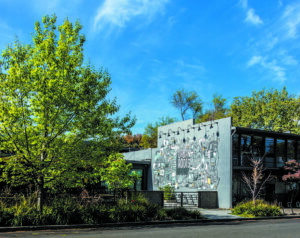
Photo Credit: Troy Cooper / Urban Roots
HOEY: Curiosity and inspiration. I have always been curious and curiosity drives a lot of what I have learned and a lot of what we do at Urban Roots. Whether it is a new ingredient, or a new process, I want to dive into it and learn as much as I can and bring that back to the brewhouse. Inspiration plays a big role in that as well – tasting a new food can inspire a new beer, or having a remarkable experience on a trip fuels me to look at how our team can improve. Looking at what we can add to make the beer or experience better for our guests. Being open to change and continual improvement is important for the entire business. We are always trying to be better than you were yesterday. You never arrive at “great” – it is a process not a destination and letting that guide or decision making keeps the whole team working together on making great beer.
DRENNON: In any successful partnership, whether it be marriage or business, both individuals complement one another and bring certain advantages to the relationship. How do you and Rob complement one another and what are the strong suits for each of you?
HOEY: Rob has taught me so much over the years about hospitality and guest experience. It’s something that comes naturally to him that didn’t to me. His ability to lead and coach has made me a better leader in the company. We still make decisions together for all business operations but knowing I have such a strong partner looking after hospitality frees me up to focus on brewery operations. I see brewers open their own businesses and frequently they are pulled into tasting room or restaurant management because that side of the business needs a lot of attention. It pulls them out of the brewery that got them into the business in the first place. It is intensely important to me that I remain involved in the brewing operations because that is where my heart is at and working with Rob allows me to do that with confidence that our hospitality won’t suffer when the brewery is demanding my attention.
DRENNON: Having been a teacher at the American Brewers Guild for 13 years, do you believe a person can learn to become a great brewer? How much is natural talent and how much is education, application, process and work ethic?
HOEY: All of those things are important. Being able to thoughtfully impact your beer through a command of the brewing process is really what it’s about. That takes experience, education, and making lots of mistakes to arrive at the thing that works. Building a tool box starts with education, then experience, and you continually add whatever is necessary in order to solve problems, create recipes, and make better and better beer as you grow as a brewer. Drive, ambition and curiosity play a major role in the growth of a brewer and ultimately learning and growing is what is going to help anyone make better beer.
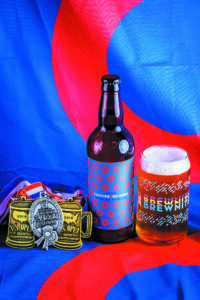
Photo Credit: Troy Cooper / Urban Roots
DRENNON: To extrapolate that line of thinking from the quality of the brewer to the quality of the beer, what is the key to brewing great, or what I like to call “wow beer,” as opposed to the more common encounter with good or “just OK beer?”
HOEY: I talk a lot about the small things, water chemistry, pH, recipe formulation, process. Every brewer has access to the same set of ingredients so it’s how you combine them and the processes you use that makes your beer unique and hopefully great. It is all the small details that can elevate a beer from good to great. The other thing I think it requires is being realistically critical of your own beers and not being afraid to continually make small tweaks to fine tune flavors. Ingredients change from crop year to crop year so recipes can’t be static. The other thing is editing what is released – no one wants to dump a batch but if what is in the tank isn’t good then it shouldn’t see the light of day. The pressure can be intense to release just ok beer especially for startups and the last two years of operational restrictions we all experienced. The damage a batch that isn’t up to your standards going out into the world can do to your reputation is far more expensive than making the choice of dumping it.
DRENNON: Where do you rank the importance of equipment, ingredients, original recipes and water quality? Or are they all inextricably linked and thus equally critical to brewing great beer?
HOEY: If a brewer is brewing by taste and experience, brilliant beer can be made on rudimentary systems. And just ok beer can be made on state of the art automated brewhouses. It really is up to the brewery to craft something delicious given the constraints that they face, be it municipal water that isn’t ideally suited for brewing, converted dairy equipment for a brewhouse, or whatever might not be an ideal situation. Making critical choices in recipe, process, fermentation can result in delicious beer in some of the most unusual brewing situations.
DRENNON: I am hoping that the title to this cover story reveals your own recipe for becoming a world class brewer: Passion, process and patience. Have I gotten close to what might just be the Urban Roots mantra?
HOEY: Pretty close! We love what we do, are passionate and process driven brewers. And patience comes in for many of our releases. Waiting until the beer is ready can be difficult. Brewing lager takes a long time. Barrel aged beer takes even longer. The temptation to rush an IPA through is real when you are up against cellar capacity and are risking running out of beer at the pub or shorting distributors. Time is an ingredient that we talk about often for our barrel aged beers, lagers, and even the quicker fermenting ales we produce.

Photo Credit: Troy Cooper / Urban Roots
DRENNON: Having been born and raised in North Carolina, one of the handful of BBQ-crazy states in our country, I would be remiss to not ask about the “Smokehouse” component of Urban Roots Brewing and Smokehouse. In my humble opinion, your BBQ equals the world class stature of the beer, which is no mean feat. Why did you and Rob choose BBQ and what is the secret to great BBQ? (grinning) Any chance that is also has to do with passion, process and patience?
HOEY: We felt that BBQ would be great cuisine to pair our beers with and it comes back to community again. BBQ is one of those foods that brings people together, whether in a back yard, at a smokehouse or in a park. It’s another social component of what we built in Sacramento. You can feed lots of people really fast so it is great for groups and gatherings. And there is no secret, just like the beer, the biggest ingredient is time. We slow smoke overnight most of the meats for service the following day. The butcher’s attention to detail on how the brisket is trimmed, when it is wrapped, how long it rests and how it is cut are all the little things that take it from good to great. There are a lot of parallels to our beer production philosophy there. And just like only being as good as your last beer, the smokehouse is only as good as its last brisket. Both facets of the business have to get up and do it again tomorrow and always strive to do it better than last time.
DRENNON: Well, Peter. Congratulations on being named Brewery of the Year. I strongly recommend that Angelenos take advantage of a short, inexpensive flight up to our state capital to visit your gorgeous and now award-winning brewery. I know I’ve been spoiled to be able to drink Urban Roots on draft at Bottlecraft in Long Beach as well as at Beachwood and Green Cheek for the wonderful collab beers you did with Julian and Evan respectively. Who distributes your beer in the greater Los Angeles region and where can readers found out which area beer bars are lucky enough to carry your damn delicious beers?
HOEY: Our beers are distributed in Los Angeles by Lime Ventures. Best way to find out where to buy the beer would be keeping an eye on your favorite pub or bottle shops’ social media. We don’t maintain a list because so many accounts these days rotate beers in and out and we are sometimes out of stock if we can’t keep up with demand but you can always ask your favorite spot to bring in our beer.
DRENNON: Speaking of collaborations, I’m sure Urban Roots is in high demand and receives more requests than you can accommodate. How do you go about choosing with whom to collab and what do you see as the value?
HOEY: For us it is about inspiration and learning together. Often, they come about while hanging out or traveling with another brewer and we just get talking about something we are working on. What are we going to learn from the other brewery and what will they learn from us? Will we create something that is outside our comfort zone or typical style? Or will we learn (or share) a new technique that helps both brewers? It’s about growth and relationships.
DRENNON: Finally, if you had to describe yourself in one word or phrase, would it be?
HOEY: Curious.

